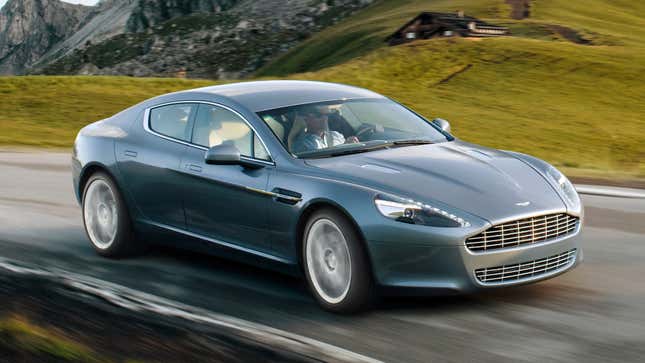
Aston Martin is bringing the DBX crossover, and soon Lagonda will also join the luxury crossover market. In a move that surprises no one, this means four-door Astons like the outgoing Rapide will likely cease to exist. But Aston is also being very careful about how its crossovers shape the brand.
For a long time, the only Aston Martin with more than two doors you could get was the aging Rapide sedan, which was more of a four-door fastback than it was a true sedan, and was infamous for its notorious back seats—Aston Martin built the car to be great to drive, not great to sit in the back of. Who can really blame them.
But once Aston completes the production run of its weird Rapide-E electric sedan conversion of the normal Rapide, that four-door is gone for good, replaced by the upcoming DBX crossover as the only four-door offering from the brand.
But that doesn’t mean that crossovers are going to take over and ruin everything, as Aston CEO Andy Palmer clarified to Motoring.com.au:
In an exclusive interview with carsales at the Le Mans 24 Hour endurance race, Aston’s boss was quick to address rumours that he would follow the path of rival luxury brands in pursuing volume.
“I purposefully restrained production to 5000 units – for exactly that reason. There’s always a tendency when you’ve got an order book to turn everything up.
“And when you do that, you start making mistakes in my experience,” said Palmer, acknowledging the new challenges an SUV posed for the car-maker’s small but well-established dealer network.
“The plant is capable of 5000 units on a single shift basis and we’ll build to that. No more.
“When Lagonda comes in 2023, we’ll turn it up to 7000 but we’ll leave it at that, with around 4000 DBXs rolling off the line and another 3000 Lagondas.”
While it’s very noble of Palmer to claim the allegedly “artificial” constraint on demand is to ensure quality of each model sold, it also means there’s going to be a ton of headlines in the next couple of years talking about how in-demand Aston’s crossovers are, which looks good for the marketing team and investors.
He claimed 72 percent of Aston Martin’s current customer base already owns a crossover, which probably means Aston should have started marketing crossovers to these people a long time ago.
Interestingly, Palmer said it was “lucky” that his brand operates so close to Jaguar Land Rover because many of his employees have gained crossover experience moving back and forth between the two companies.
If they’re getting tips from Jaguar Land Rover, I can see why they’re so concerned about quality.